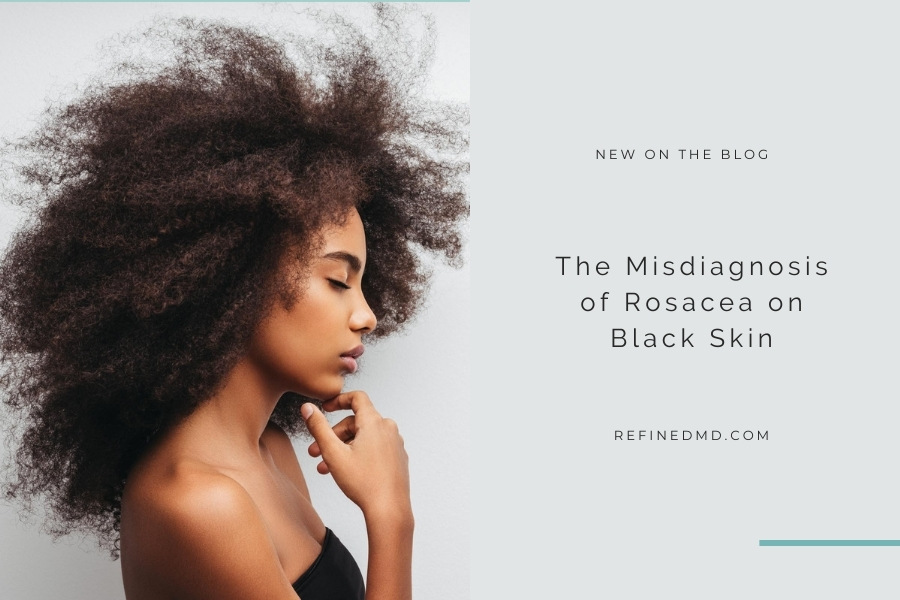
18 Jul The Misdiagnosis of Rosacea on Black Skin
Imagine someone with rosacea, and what do you see—specifically, what is the person’s skin tone? Rosacea is often considered an affliction on fairer skin, but anyone of any skin tone can struggle with this non-curable disease that causes flare-ups. People with Black and brown skin can have rosacea, and unfortunately, they are routinely misdiagnosed. At RefinedMD, we help people with all skin tones and types achieve healthier skin. Even though there is no cure for rosacea, there are ways to manage and reduce flare-ups using both lifestyle changes and in-office treatments.
Rosacea is a type of chronic inflammation and for years the myth has persisted, even in some medical communities, that only white people get rosacea. However, the Journal of the American Academy of Dermatology reports that up to 40 million people with brown or Black skin have rosacea around the globe. From a marketing perspective, serving these tens of millions of people makes financial sense and yet still the majority of brands don’t represent people of color in such beauty advertisements. Even worse, there is a huge disparity of information when it comes to rosacea on Black and brown skin. This all leads to rosacea being regularly misdiagnosed in Black and brown patients.
Rosacea Types
There are different types of rosacea, although the categorization changed 20 years ago. However, whether it’s erythematotelangiectatic rosacea (flushed cheeks) or papulopustular rosacea that causes bumps and spots, nobody knows exactly what causes it. Regardless of skin color, the symptoms are the same and typically present on the face. Rosacea causes a lot of little broken blood vessels, most often on the nose and cheeks. Triggers can make these vessels dilate, exacerbating the flushing and redness. Symptoms can also include swelling, sensitivity, and skin texture changes.
Of course, Black and brown skin comes with more nuances and oftentimes challenges when dealing with rosacea diagnosis and treatment. Redness does not present the same way because melanin can mask it. Rosacea can look subtler on darker skin, but that doesn’t mean it actually is. On Black skin, rosacea can look purple, violet, or darker brown. Rosacea more often presents as pustules and inflamed bumps on Black and brown skin, too. This confusion, both in medical providers and patients, can lead to trying various over-the-counter products that either don’t work or worsen rosacea symptoms.
Acne vs. Rosacea
Acne and rosacea are two very different skin conditions, though of course it’s possible to have both. However, if someone thinks rosacea is acne and treats it as such, there can be problems. Retinoids are a common treatment for acne, but they can seriously trigger rosacea. Salicylic acid is another acne treatment that can worsen rosacea. There are over 3,000 unique skin conditions, so misdiagnoses are bound to happen—however, when it comes to Black and brown skin, it is paramount to work with a skin care expert who is committed to a correct diagnosis in order to inform treatment.
Rosacea is typically considered harmless, but if left untreated and unmanaged it can lead to complications. Permanent hyperpigmentation and a thickening of the skin on the nose are the most common. Additionally, rosacea can affect the area around the eyes and, ultimately, vision. It is critical that a person with rosacea get a correct treatment plan in place, which can include various in-office treatments like lasers, light-based therapies, and microneedling. All of these options are suitable for Black and brown skin, though of course the right laser or light must be selected (otherwise there is a risk of hypopigmentation).
The Reality of Rosacea
It would be remiss to ignore the fact that there is systemic racism at play when it comes to rosacea diagnosis and treatment for Black and brown skin. However, this has snowballed into an issue that affects both the medical community and patients. When someone is Googling their symptoms but they don’t see any examples that look like them (as the vast majority of rosacea patients featured in advertisements are white), that can lead a person to incorrectly self-diagnose or not reach out to a medical professional about rosacea.
Just like any skin condition, “common” symptoms do not necessarily apply to every patient. It is estimated that about 14 million people in the U.S. have rosacea, but there are likely more who are undiagnosed and misdiagnosed—and many of them probably have Black or brown skin. To get help with any of your skin concerns, get in touch with RefinedMD today. Call the office, complete an online form, or start an online chat.
